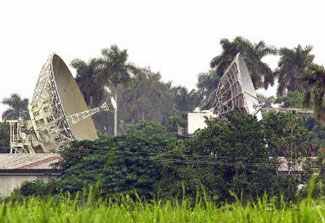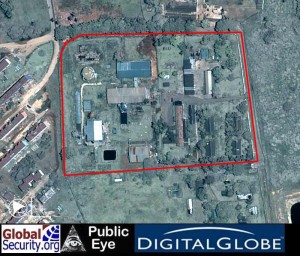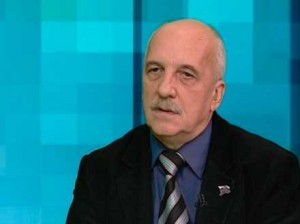
Russia will reopen listening post at Lourdes
Russia will reactivate the electronic monitoring station in Lourdes, near Havana, that it abandoned in 2001, the Russian daily Kommersant revealed Wednesday (July 16), citing sources in the Russian government.
 According to the sources, Moscow initiated talks on the subject with Havana “a few years ago but sharply increased them early this year (the Russian military chiefs met several times with their Cuban counterparts) and within several months the parties managed to settle all existing issues.”
According to the sources, Moscow initiated talks on the subject with Havana “a few years ago but sharply increased them early this year (the Russian military chiefs met several times with their Cuban counterparts) and within several months the parties managed to settle all existing issues.”
“The arrangements were finalized during President Putin’s visit to Havana last Friday,” the newspaper says.
One source told Kommersant that the value of the agreement on the Lourdes center cannot be overemphasized. “All I can say is one thing — finally!” the source said, evidently pleased with the arrangement.
The Russian Defense Ministry and the General Staff did not comment after the news was published.
The Lourdes listening center began operations in 1967 under Soviet management and later under Russian management. In 2001, Russia shut it down, due to lack of funds and U.S. pressure. It is reviving it now because of improved finances and the cooling of relations with the United States.
“Our relationship soured long before [the crisis in] Ukraine,” one of the sources told Kommersant. Washington “did not appreciate our gestures of good will,” another source said.
Therefore, according to a senior source in the Defense Ministry, Moscow had every reason to revive the project, in order to enhance its ground surveillance operations.
Lourdes had the most powerful Soviet intelligence-gathering center outside the Soviet Union, Kommersant recalls. It quoted then-Defense Minister Raúl Castro as saying that the Soviet Union received 75 percent of all information about the U.S. through Lourdes.
That figure is probably overstated, Kommersant notes, but the fact that the station is 250 kilometers from the U.S. allows it to monitor much of the radio traffic of “the potential enemy.”
Kommersant believes that a restored Lourdes will not require as much personnel as it did in Soviet times, when it maintained a staff of 3,000 specialists. That number dropped to 1,500 in the 1990s and will probably drop further because modern radio interception equipment is much better than in the past, the newspaper said.
The newspaper’s sources did not disclose the cost of the restoration work, saying only that all parameters are being studied. Until 1992, Moscow utilized the facilities at no cost. In November of that year, an agreement was signed whereby Moscow leased the base until 2000, promising to pay $90 million for 1992, $160 million for the period 1993-1995, and $200 million for the period 1996-2000.

In July 2000, a U.S. bill on “Russian-American Trust and Cooperation” barred Washington from restructuring Russian debt until Moscow closed the Lourdes base. Moscow agreed, also shutting down its naval base in Camranh, Vietnam.
In February 2002, the last Russian specialists left their Lourdes post. The buildings were turned over to Cuba’s University of Computer Technology.
“Today, a return to Lourdes is more than justified,” retired Col. Viktor Murakhovski told Kommersant. “The functionality of satellite radio intelligence and radio interception from Russia has been significantly reduced. [Lourdes’] immediate proximity to the U.S. will allow the Russian military to dispense with a space component.”
Another military expert, Army Gen. Vyacheslav Trubnikov, told Kommersant that “Lourdes enabled the Soviet Union to look inside the Western hemisphere. From that point of view, its loss affected our understanding of the processes taking place in the region.
“For Russia, which is defending its legitimate rights and place in the world community, it is no less valuable now than it was then for the USSR.”


